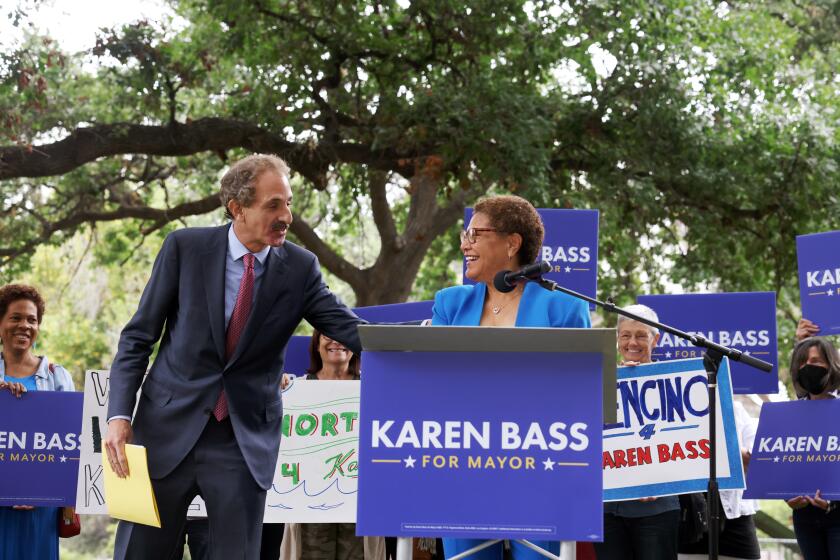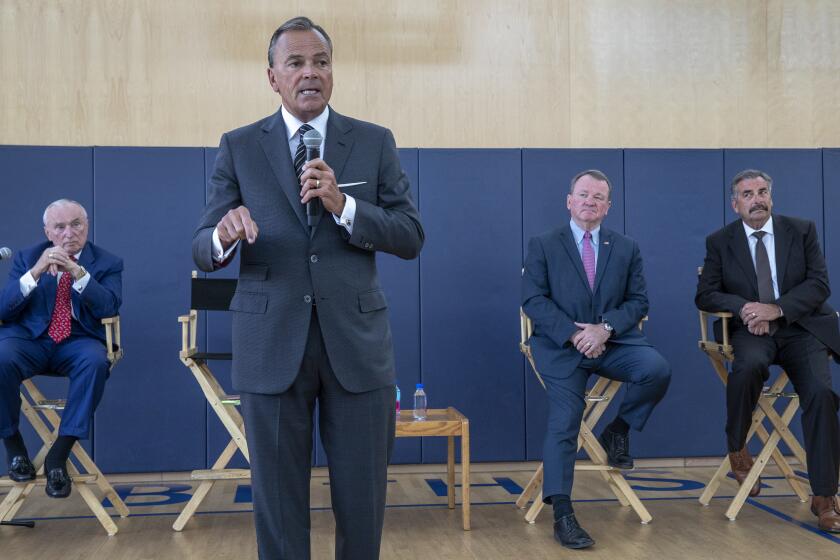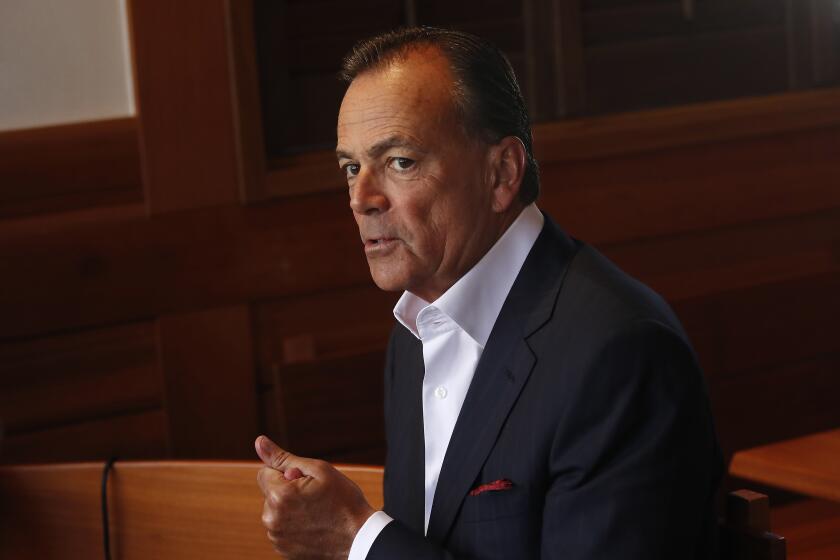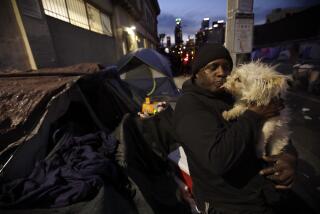L.A. loves the glitz but suspects the rich. Will it turn to a billionaire mayor?
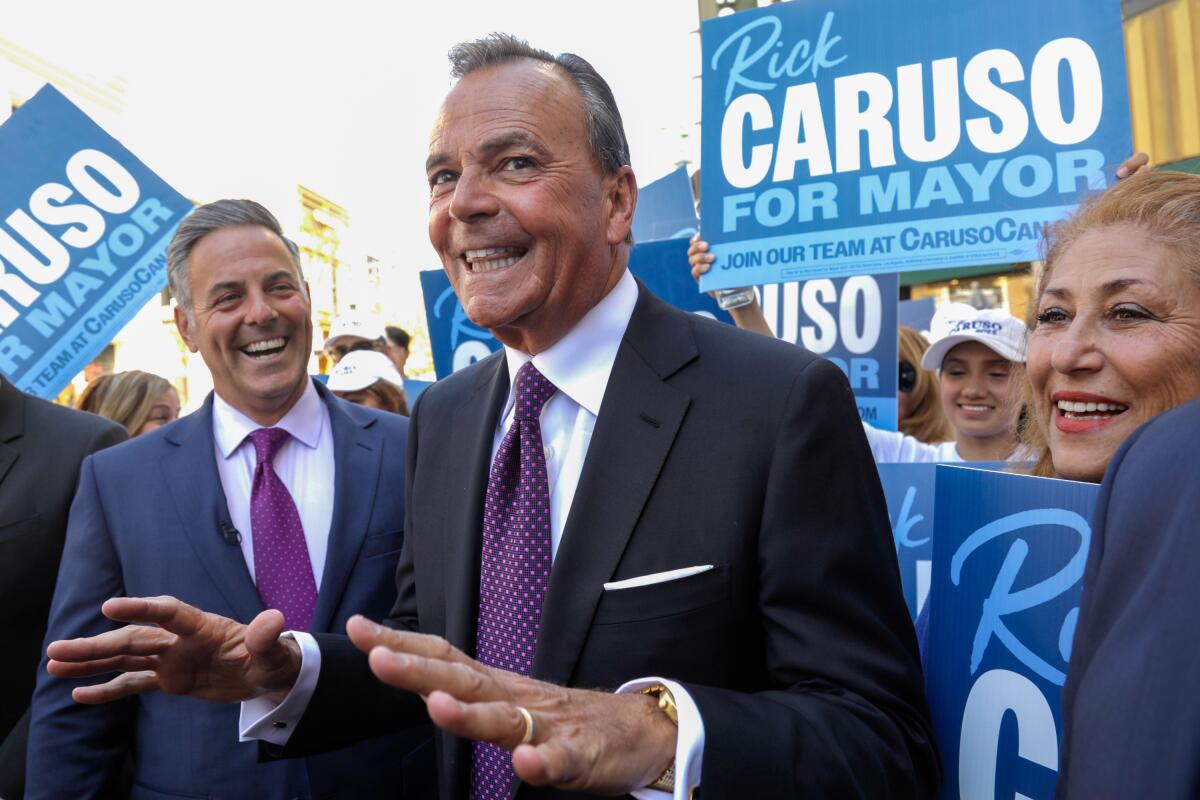
Joe Russell, a Hollywood producer who has worked on spots for billionaires seeking political office, was on a date with his wife at the Grove on a recent afternoon when he took a break to talk about the suddenly relevant phenomenon of L.A. billionaires seeking public office.
The Grove was developed by Rick Caruso, a real estate mogul who seeks to trounce a field of experienced elected officials to become Los Angeles’ next mayor. He has spent millions of his own money to get his name out, and his run comes as many feel that homelessness and rising crime are overwhelming the city, at least partly because of poverty and gross inequality.
Russell, whose political credentials include campaigns for Tom Steyer, a billionaire who ran for California governor in 2018, and Michael Bloomberg, a billionaire who served as New York’s mayor and ran for president in 2020, said he could well understand why Caruso would run.
“If you’re the top in business, you might think, maybe I’ll get into politics,” he said. But the producer, who is undecided in the race, added that it was “a great [open] question” whether business success translates to being an effective political leader — and whether Caruso had the empathy to embrace the problems of Los Angeles’ residents. “It’s really about who he is and not about what he’s done.”
Caruso’s malls — the Grove, the Americana at Brand, Palisades Village — are famous for providing the illusion of quaint city streets, but a sparklingly clean and sanitized version, without any of the problems of actual cities. If Caruso manages to become mayor, he will step into the top job at a time when the gap between the realities of Los Angeles’ streets and the fantasy streetscapes of places like the Grove has never felt wider to many residents.
And he will become something of an anomaly, because although Los Angeles may be known globally as a place of over-the-top wealth and glitz, the city’s mayors have typically been cut from more modest, less glamorous cloth. With the exception of Richard Riordan, who was elected in 1993 after a period of momentous tumult, voters have tended to select men (always men) who have put in years or decades on the government payroll before occupying the ornate mayor’s office on the third floor of City Hall.
Caruso has emphasized his long history of civic involvement. He served for years as president of the city’s police commission, on the board of the Department of Water and Power and also as the chair of USC’s board of trustees. He has also given away millions to programs supporting impoverished children, among other causes. But as he blankets the city’s airwaves and social media feeds with advertising, his major opponents — all of whom have spent years or decades in elected office — are trying to use his money against him.
They point out how much he has, how much he inherited from his father — who founded Dollar Rent A Car — and, most of all, how out of touch his wealth makes him from the vast majority of Angelenos.
“Some people have dedicated their entire life to not making money but doing public service,” Rep. Karen Bass said to Caruso during a debate. Bass, who has served a decade in Congress and before that was in the state Assembly, has bristled at Caruso’s attacks on other elected officials.
“During the last two years of the global pandemic, you were concerned with your rents at your mall and $14,000 nights at your hotel,” said Councilman Kevin de León, “while I was out there, knocking on doors, giving vaccinations and PPE equipment and hot meals to everyday Angelenos.”
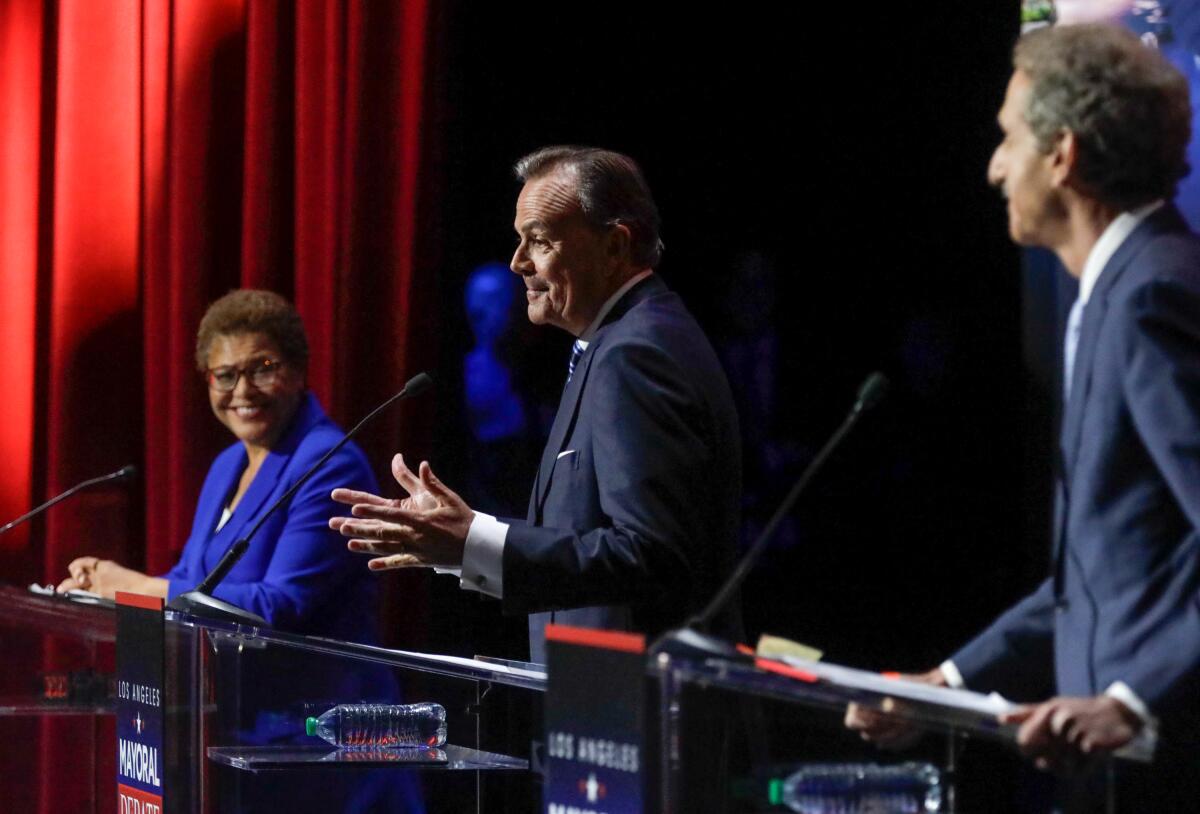
“What kind of city do we want?” asked De León in an interview. “Do we want an L.A. that works only for the super wealthy and the elite? Or a city that works for us? Working people, middle-class people? The city deserves a mayor who knows what they have been through. It’s very different than when you’re born with 100 silver spoons.” The Eastside councilman, who was previously the leader of the state Senate, makes a habit of stressing his own impoverished childhood on the campaign trail.
“I think you have a $100-million yacht that is registered under the flag of the Cayman Islands,” City Atty. Mike Feuer, who previously served on the City Council, said to Caruso during the same debate before questioning whether Caruso pays enough taxes. Feuer, endorsing Bass, dropped out of the race this week, explaining that “without a major infusion of additional money to stay on the air, I can’t win.”
Even Councilman Joe Buscaino, who threw his support behind to Caruso when he dropped out of the race in early May, at times lobbed attacks at the developer’s wealth.
“I’m not made of money,” he said in the first debate. He referenced his immigrant parents who worked jobs in San Pedro and would “come home smelling like fish.” He pointed out that Caruso had been endorsed by Gwyneth Paltrow, whereas his own “inner circles are people like you, longshoreman, teachers, nurses, police officers, firefighters, truck drivers.”
Mike Feuer’s departure from the L.A. mayor’s race three weeks before voting ends leaves Karen Bass, Rick Caruso and Kevin de León vying for a large bloc of undecided voters.
The focus on riches is giving some in the city a bout of heartburn.
Benjamin Torres, president of the Community Development Technologies Center, which works on economic development in South Los Angeles, said he hoped the contest would “bring together and center the lives of those most marginalized” in L.A. “That is not what we have now.”
“The topic that [Caruso] has all this wealth and privilege ... is taking away from the substantive details about how to address these issues,” Torres said.
The attacks on Caruso’s deep pockets mirror those effectively deployed against novice California politicians such as U.S. Senate candidate Michael Huffington and gubernatorial hopefuls Al Checchi and Meg Whitman. But political analysts say that, in the current mayoral race, they may not be resonating as much with an electorate that is hyper-focused on homelessness and crime and fed up with the current leadership’s response to those problems.
“That is not the campaign that we thought we were going to have six months ago,” said Bill Carrick, a veteran political strategist who has advised mayoral candidates in the past but isn’t working for any of the candidates in this race. Carrick said he would have predicted a mayoral race that featured robust debate ranging from climate change to traffic to infrastructure and beyond.
Instead, Carrick said, he has been struck by how many voters across the political spectrum seem to be deliberating which of the candidates can best address homelessness and crime, regardless of their political persuasion. “We’re used to mayor’s races where people are strongly partisan about one of the candidates,” he added. “And that is not going on right now.”
Money doesn’t always buy the office
Going back nearly a century, the city’s mayors — many of whom are long forgotten by residents though their names grace buildings and public squares around town — mostly made a steady climb up through government to the top spot. Fletcher Bowron was a state worker and then a judge before being elected in 1938 and serving for 15 years. Norris Poulson was in the state Assembly and Congress before becoming mayor, as was Sam Yorty. Tom Bradley was a police officer.
Los Angeles voters broke the pattern in 1993, when, reeling from the civil unrest after the Rodney King verdict, they elected businessman Richard Riordan, who famously worked for a dollar a year. But even back then, when distrust of the wealthy was not as great as it is today, many voters raised questions about whether business prowess would translate to the slow, often humbling work of government.
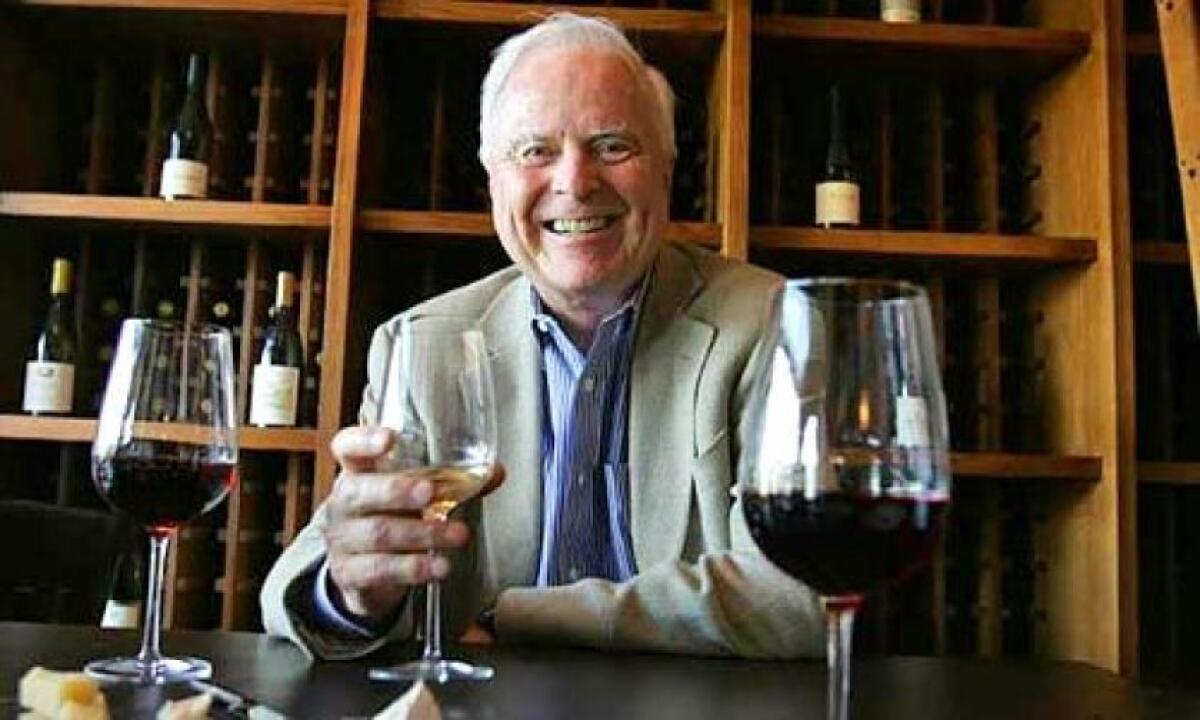
Riordan, who eventually won fans across the ideological spectrum, barely eked into office with 51% of the vote. On Thursday, Caruso’s campaign announced Riordan had endorsed the developer for mayor.
In 2001, developer Steve Soboroff, a mayoral advisor, tried to follow his friend Riordan into City Hall, mounting a campaign in which he cheerfully championed to a reporter all the malls and shopping plazas he had built and touted his prowess as a developer.
But voters weren’t having it. Soboroff came in third, and career civil servants returned to their perch at the top of city government for two more decades. James K. Hahn, son of a beloved county supervisor and brother of a member of the City Council who eventually went on to join the Board of Supervisors herself, was city attorney before becoming mayor. Antonio Villaraigosa served in the Assembly and on the City Council before ascending to the top job. Eric Garcetti also did a long stint on the council.
But as in 1993, when Riordan rode the cross currents of civic uncertainty to overcome voters’ distrust of a rich candidate, Caruso may be able to seize on voters’ disenchantment.
Voters may not care one way or another about Caruso’s fortune, Carrick speculated, if they become convinced he is the best person to solve the core problems of homelessness and crime.
On top of it all, Carrick added, Caruso’s ability to talk directly to voters because of all his money is giving him a huge advantage that is hard to overcome. At last count, Caruso had poured more than $27 million into his campaign, far outstripping the amount that any other candidate has managed to raise or spend.
Rick Caruso’s campaign has spent more than $23 million — most of it his own money — in the L.A. mayor’s race, according to finance disclosures submitted to the City Ethics Commission on Thursday.
“He’s buying stuff no one ever buys in campaigns, because he can afford it,” Carrick said, referring to the impossibility for anyone in Los Angeles to avoid Caruso’s advertising at the moment.
“I’m fighting someone with unlimited funds,” Bass said at a fundraiser this week. In a statement, a spokesperson added that “Angelenos see the difference between a billionaire who watched the city’s ... crisis from his yacht, and a dedicated change agent and organizer who has spent her life in service to Los Angeles.”
In interviews with voters across much of the city, one thing was clear: Caruso’s message was definitely penetrating. Some voters said he was the only candidate they could easily name.
In Watts, Mark Taniehill, 60, who works as a security guard, said that income disparities in Los Angeles were a problem, but the wealth gap among the candidates didn’t bother him so much.
“It’s not about the money, it’s about the person,” he said, adding that he hasn’t fully studied the candidates but was leaning toward Bass. “Money don’t mean a thing. It’s good to have, but you got to look at the person.”
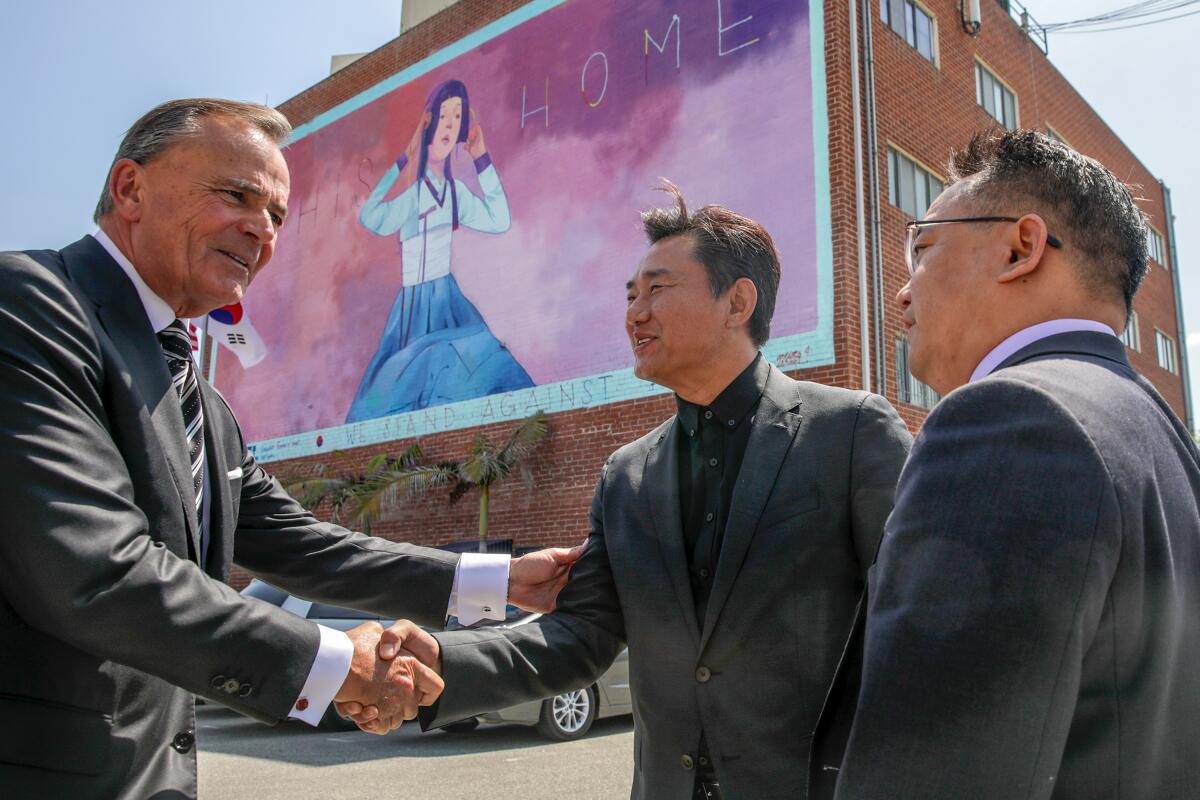
Eddie Hill, 69, who is retired, agreed. He said he has been dismayed to see a huge increase in the number of homeless people in his neighborhood in recent years.
“They’re not doing enough about it,” he said of political leaders. “They talking about it, but I don’t know if they mean it.” He added that it is easy for politicians to sit in their homes “on top of a hill” and talk about fixing things without having a clue what’s going on in places like Watts. “They get paid and forget about regular people.”
But Hill said he is worried about other issues as well, chief among them the skyrocketing cost of living.
Rick Caruso has considered running for L.A. mayor before but has never jumped in. For this year’s race, he promises a “final decision shortly.”
In El Sereno, Carolina Bautista, 26, took a break from playing with her two young children at Lincoln Park to say that she would prefer a mayor who could relate to the background of many in Los Angeles, “someone who did grow up in the struggle and actually made it out.”
She said she liked the prospect of Kevin de León but felt generally disillusioned with the process. “Everything is bought,” she said.
Back at the Grove, Russell and his wife, Casey, continued their date. She said she thought Caruso had a huge advantage at this point because of his ability to blanket the airwaves.
“People are going to vote for the names they recognize,” she said.
“But, we love the Grove,” she added.
More to Read
Start your day right
Sign up for Essential California for news, features and recommendations from the L.A. Times and beyond in your inbox six days a week.
You may occasionally receive promotional content from the Los Angeles Times.
